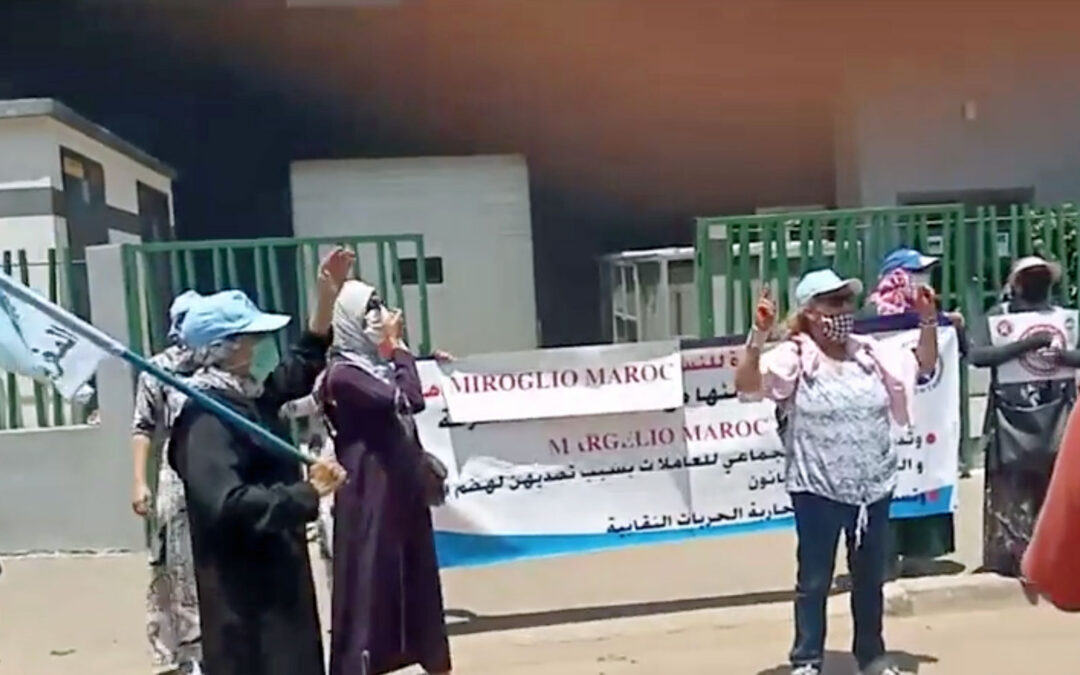
Aug 7, 2020
Garment workers at the Miroglio Maroc factory are standing strong with 14 co-workers who they say were fired for speaking out against the lack of sufficient safety gear and other protective measures at the workplace during the novel coronavirus pandemic.
Three workers were recently diagnosed with COVID-19, and the 14 fired workers alerted authorities to the unsafe working conditions at the plant, where up to 250 workers make ready-wear garments. The employer says he fired the workers, eight of whom are union members, for “defamation,” that is, allegedly attacking the reputation of the company.
Yet the Moroccan Labor Union (UMT) says the owner also fired workers who took part in forming the factory union in April. The employer also sought to intimidate the 14 fired workers, all of whom worked at the factory between five and six years, by calling in a judicial commissioner, a move the UMT says violates Morocco’s labor law. Their union, the Union Office of Miroglio Marco, is affiliated to the Federation of Garment, Textile, and Leather Workers/UMT.
Factory union leaders say the employer refuses to pay the fired workers for May and June, and demanded they sign a statement saying they will not strike, a move prohibited by the country’s labor law. Further, union representatives say the general manager has verbally harassed women garment workers who requested safety and health protections.
Workers now are waiting for the results of their COVID tests, which the company was forced to undertake after the workers alerted authorities.
Employers worldwide are penalizing and even firing workers who demand their rights to safety measures to protect against COVID-19, and are using the pandemic to lay off workers, often targeting those seeking to form unions or exercise their rights on the job. But, together with their unions, workers are fighting back.
Clapping as they rallied outside the plant in Casablanca’s Albarnoussi industrial district in recent days, the workers chanted, “We do not want injustice, we do not want to strip women of their rights.”
“Long live the Moroccan labor union.”
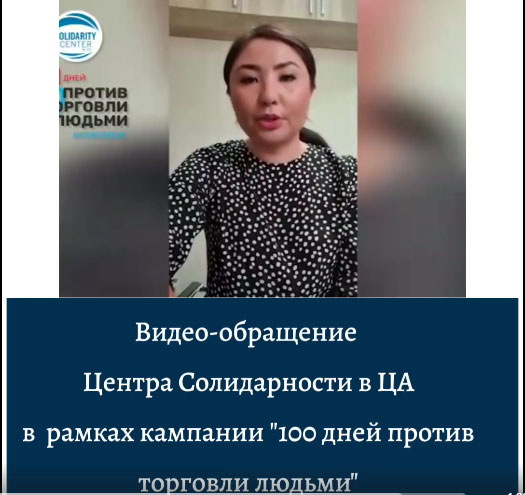
Aug 4, 2020
Insan-Leilek foundation and the Trade Union of Migrants of the Kyrgyz Republic, both Solidarity Center partners in Kyrgyzstan, are actively engaged in the “100 Days Against Trafficking in Persons” youth campaign. With a focus this year on worsening risks for workers who migrate abroad to earn their livelihoods during the COVID-19 crisis, the effort aims to raise public awareness within the Kyrgyz Republic on issues related to trafficking. Insan-Leilek is a local Kyrgyz diaspora foundation committed to providing aid to the country’s migrant workers.
As one of the organizers of the campaign, the Solidarity Center joined with regional coordinating councils on combating human trafficking; the country’s state agencies on Migration and Youth, Physical Culture and Sports; more than 30 youth organizations; UN agencies under UNODC; and donors including the U.S. Agency for International Development (USAID).
Campaign activities, held online due to COVID-19, include:
- An online media launch event featuring support messages from members of the coordination councils for preventing and combating human trafficking in seven regions, including Bishkek and Osh.
- A live broadcast on “Batken Media” television station focused on labor migration during which the chairperson of the Trade Union of Migrants of the Kyrgyz Republic, Zhamalidin Ishankulov, explains how the trade union is fighting for migrant worker labor rights and provides Kyrgyz migrants with information on assistance while working abroad.
- A Solidarity Center video message on the importance of the campaign and the role of the Solidarity Center in the prevention of combating human trafficking.
- A Solidarity Center webinar for youth organizations that will address the promotion of labor rights and freedom of association as a preventive measure against forced labor and human trafficking.
- Two animated videos and two podcasts for social media distribution that emphasize pre-departure training for labor migrants on the rules of registration, basic labor rights information and encouragement to stay home—all of which are important prevention measures against forced labor and human trafficking.
With Few Jobs for Youth, Young Workers Forced to Migrate
Youth un- and underemployment stands at 55 percent in Kyrgyzstan. Most young people feel forced to migrate in search of work, primarily to Russia and Kazakhstan, although also further to South Korea, Turkey or other countries. Kyrgyz migrant workers provide more than one-third of the Central Asian country’s GDP in money they send home. When workers migrate from Kyrgyzstan, they often face discrimination, exploitation and unsafe working conditions. Many are at risk of being trafficked and subjected to forced labor.
The Solidarity Center believes human trafficking is at its core about the exploitation of worker rights, and that the best way to prevent conditions that allow human trafficking is to ensure workers have the tools at their disposal to defend their rights. To that end, the Solidarity Center helps organize pre-departure training for migrants preparing to leave Kyrgyzstan to ensure they are aware of their legal rights and the conditions they may encounter, develops and disseminates informational materials on safe migration and provides contact information for legal support services should migrants encounter problems abroad. Working with partners in both origin and destination countries, the Solidarity Center also documents instances of migrant worker exploitation, including trafficking for forced labor, and helps migrant workers organize and join workers’ organizations to help them protect their rights.
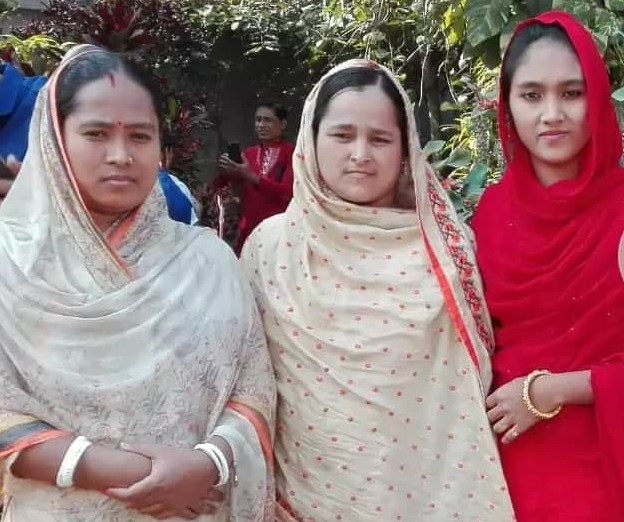
Jul 30, 2020
After hundreds of laid-off garment workers took to the streets of Ashulia, Bangladesh, and rallied at the Dhaka Export Processing Zone in recent weeks, factory management and the Bangladesh Export Processing Zones Authority agreed to compensate them with one month’s wages and the annual Eid festival bonus.

Maksuda: “When we united together, management had no choice.” Credit: Shumon Ali
Because all 130 retrenched workers had worked at the factory less than a year, the company was not required by law to provide them with compensation after they were laid off. Yet all the workers received between $150 and $315, a major achievement that Maksuda, one of the factory workers who took part in the action, says resulted from unity and collective action.
“I did not think we would get it, but when we united together management had no other choice. I am quite happy with the money I have received.”
The Talisman Limited factory workers are among tens of thousands of Bangladesh garment workers who have lost their jobs because of declining clothing orders worldwide following outbreak of the COVID-19 pandemic. The government reports that 29,369 garment workers have been laid off, but union leaders say the numbers are much higher.
Garment Workers Stand Together to Win Pay after Country-wide Layoffs
Workers and unions have been taking action at factories around the country in response to layoffs, and in many cases have blocked traffic or halted work to have their demands met. Overall, Bangladesh has lost more than $3.18 billion in orders since April and the start of COVID-19, according to the Bangladesh Garment Manufacturers and Export Association.
Maksuda, like the other retrenched factory workers, received her layoff notice by text message. Desperate to support her family, she joined with Farida, Tania and 11 other laid-off garment workers to contact the Solidarity Center for assistance.
The Solidarity Center legal team advised each worker to seek one month’s basic pay as compensation, along with a festival bonus. The next day, the leaders organized all the retrenched workers and went to the factory, but they found the factory gates locked and no management in sight, so they proceeded to the Dhaka Export Processing Zone to demand payment. In the process, they set an example of the concrete gains collective action can achieve.
Talisman Limited employs some 1,200 workers, at least 70 percent of whom are women.
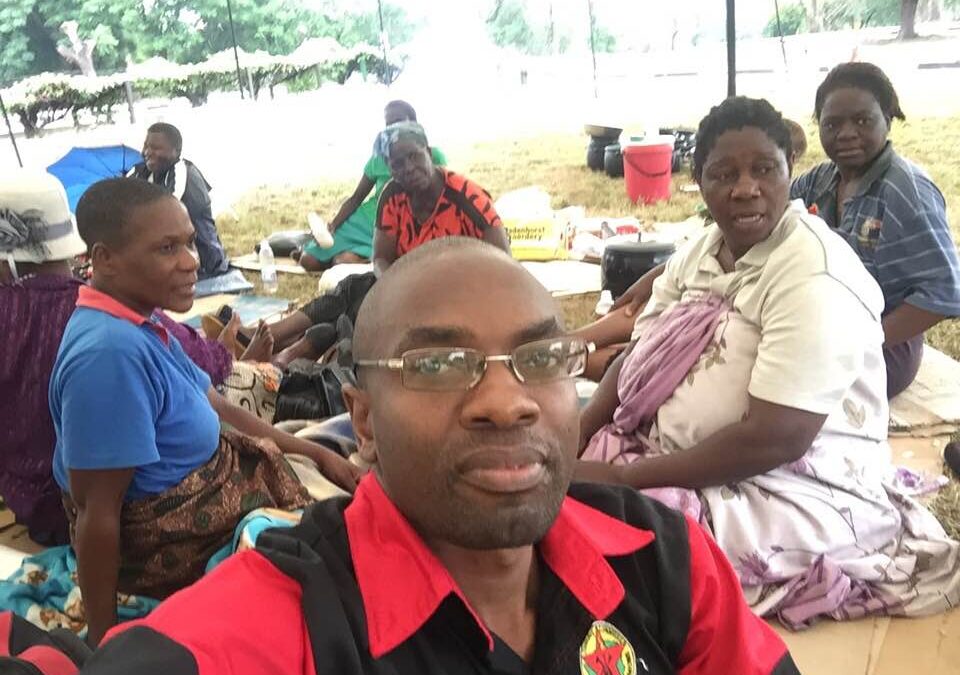
Jul 28, 2020
The Zimbabwe police have placed Zimbabwe Confederation of Trade Unions (ZCTU) President Peter Mutasa on a “wanted list” and branded ZCTU as a terrorist organization following the union confederation’s calls for a national mobilization against government corruption and demands for decent wages for workers during the novel coronavirus epidemic.
“For defending workers’ rights, we are called terrorists by ZANU PF,” ZCTU said in a Tweet, referring to the ruling party, the Zimbabwe African National Union–Patriotic Front. “We are a bonafide trade union movement in terms of the law.”
Ongoing death threats and a sustained government crackdown forced Mutasa and ZCTU General Secretary Japhet Moyo into hiding in 2019, and union leaders across Zimbabwe have been repeatedly beaten, kidnapped and arrested with hundreds injured by security forces since the government of Emmerson Mnangagwa replaced long-time President Robert Mugabe in November 2017.
The United Nations in June called on Zimbabwe to immediately end a reported pattern of disappearances and torture that appear aimed at suppressing protests and dissent.
Since 2017, police have often used force to prevent worker protests against skyrocketing costs and shortages of essential items such as food and fuel. Zimbabwe’s currency has collapsed against the U.S. dollar and inflation has risen to more than 700 percent, wiping out Zimbabweans’ savings.
Zimbabweans Struggle as Inflation Destroys Salaries, Savings
The vast majority of workers in Zimbabwe support themselves and their families as market vendors, taxi drivers and in other informal economy jobs where pay is low and often uncertain, and sick pay and other benefits are nonexistent. In the formal sector, nurses, teachers and others have seen their incomes evaporate due to inflation, even as their salaries are already too low to cover basic needs.
Many Zimbabweans also face starvation, as parts of the country have been hit by severe drought. The UN World Food Program warned that food supplies will run out in 2020 unless urgent assistance is provided.
Yet the government imposed a $23 a month minimum wage during the pandemic lockdown that falls far short of the amount needed for families to survive, Mutasa said in a recent interview.
“Rent for a room is roughly $20, which means the majority of workers are earning just sufficient to pay rentals for one room. What about food, clothing, school fees, medical care, transport, etc.?”
ZCTU is urgently focused on “ensuring that workers get a reasonable minimum wage,” Mutasa said. “We also want an immediate change in the manner our country is governed. We have to fight against corruption, exploitation of our resources, illicit financial flows, shrinking democratic space, human and trade union violations as well as other governance deficiencies causing untold suffering to citizens.”
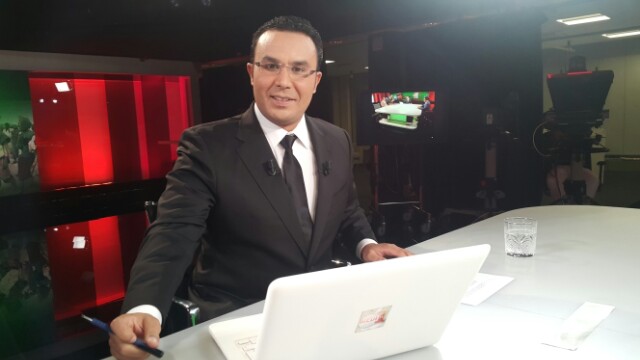
Jul 21, 2020
The Union of Moroccan Workers (UMT) is condemning the recent firing of journalist and television host Youssef Belhaissi and attacks on other members of his union, including Aziz Fathi, a union office coordinator, who was demoted from editor-in-chief.
The company had barred Belhaissi, deputy secretary-general of the union representing media workers at Medi1 TV, from appearing on screen since late June, a move condemned by union and media advocates. The union is an affiliate of the National Federation of Press, Media and Communication/UMT.
Fathi, who has reported on the dangers of the novel coronavirus and engaged in public advocacy and awareness of the pandemic, also saw his computer destroyed, according to UMT. His colleague, Hicham Faouzi, UMT first general secretary, also was demoted without cause.
The actions follow weeks-long demands by employees at Medi1 TV, which broadcasts news, business and financial markets and sports, for stronger sanitary measures to protect against spread of the virus, and for COVID-19 testing. Employees say the company has refused to allow workers eligible for teleworking to do so.
UMT says the company first responded to the workers’ demands for safe conditions by unilaterally closing Medi1 TV’s Rabat office and scheduling the transfer of all staff to Tangier in August amid the pandemic.
“Trade union action is neither a crime nor a misdemeanor,” UMT says in a statement. “It is guaranteed in the kingdom’s constitution, and in all international and regional covenants and agreements ratified by Morocco, a commitment that Morocco has made to itself in international and regional forums.”
Employers Use COVID Crisis to Target Workers
Employers worldwide are penalizing and even firing workers who demand their rights to safety measures to protect against COVID-19, and are using the pandemic to lay off workers, often targeting those seeking for form unions or exercise their rights on the job.
The crisis also has accelerated moves in recent years to limit press freedom, part of a global attack on democracy that often involves targeting individual journalists, media workers and sometimes entire press enterprises.
Morocco’s freedom of press score has fallen every year since 2015, according to World Press Index compiled by Reporters Without Borders (RSF), which ranks Morocco 135th out of 180 countries in its 2019 annual report on freedom of press.
In December, police arrested journalist Omar Radi for a nine-month-old tweet criticizing a judge, the 11th journalist imprisoned in Morocco since 2011, more than twice as many as the previous decade, according to the Committee to Protect Journalists.






